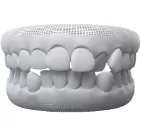Temporomandibular Joint (TMJ) disorders are common conditions that affect the jaw joint, causing discomfort and limiting jaw movement. Many people in Dubai suffer from TMJ disorders without understanding the causes, symptoms, or available treatment options. In this comprehensive article, we will explore what TMJ disorders are, the symptoms associated with this condition, and the best treatment options available for managing jaw pain and improving quality of life.
What is TMJ Disorder?
The temporomandibular joint is the hinge that connects the lower jaw (mandible) to the temporal bone of the skull. This joint allows for smooth movements of the jaw, such as opening and closing the mouth, chewing, and speaking. TMJ disorders occur when this joint is injured, inflamed, or misaligned, leading to pain, restricted movement, and other uncomfortable symptoms.
TMJ disorders may arise from a variety of factors, such as injuries to the jaw, teeth grinding (bruxism), arthritis, or even stress. People experiencing TMJ disorders often suffer from symptoms that can interfere with their daily activities. Understanding the nature of TMJ disorders is key to finding appropriate treatment and relief.
What Are the Common TMJ Symptoms?
TMJ disorders are typically associated with several recognizable symptoms, although these can vary in intensity from person to person. The most common symptom is jaw pain, but there are other signs that indicate TMJ problems. These symptoms include:
- Jaw Pain and Tenderness: One of the hallmark symptoms of TMJ disorder is persistent pain in the jaw. This pain may be sharp or dull and can worsen when chewing or speaking.
- Clicking or Popping Sounds: Many people with TMJ disorders hear a clicking or popping sound when opening or closing their mouths. This sound usually results from misalignment of the joint or damage to the cartilage.
- Difficulty Chewing: Chewing food can become painful and difficult for individuals with TMJ disorders. The joint may feel stiff, and the jaw may tire quickly while eating.
- Locked Jaw: In severe cases, the jaw can become locked in an open or closed position, making it difficult to move.
- Headaches or Ear Pain: TMJ disorders can also cause headaches, particularly in the temples, and some people experience ear pain or a sensation of pressure, even when there is no ear infection present.
- Facial Pain or Swelling: Discomfort may spread to the surrounding muscles of the face, leading to generalized facial pain or swelling on one side of the face.
What Causes TMJ Disorder?
TMJ disorders can be triggered by several different causes, which means that identifying the specific cause in each case is crucial for effective treatment. Common causes include:
- Teeth Grinding (Bruxism): Many people unknowingly grind or clench their teeth, particularly at night. This constant pressure on the jaw can wear down the joint and lead to TMJ problems.
- Jaw Injuries: Direct trauma or injuries to the jaw from accidents or falls can damage the temporomandibular joint, leading to long-term pain and discomfort.
- Arthritis: Conditions such as osteoarthritis and rheumatoid arthritis can cause inflammation and deterioration of the joint, affecting its function.
- Bite Misalignment: When the teeth or bite are not properly aligned, excessive stress is placed on the jaw joint, which can eventually lead to TMJ disorders.
- Stress: Psychological stress can lead to muscle tension in the jaw, which exacerbates TMJ pain and discomfort.
Understanding the root cause of your TMJ disorder can help guide the appropriate treatment plan.
How Are TMJ Disorders Diagnosed?
Diagnosing a TMJ disorder requires a thorough examination by a dental or medical professional. If you are experiencing any of the symptoms mentioned above, it’s important to seek professional help to ensure you get an accurate diagnosis. The diagnostic process may include:
- Physical Examination: A dentist will evaluate your jaw’s range of motion and listen for any sounds, such as clicking or popping, when you move your jaw. They may also assess the tenderness of your jaw muscles.
- Imaging Tests: X-rays, CT scans, or MRI scans may be recommended to get detailed images of the temporomandibular joint. These scans help detect any abnormalities in the bones, cartilage, or joint tissues.
- Review of Symptoms: Your dentist will also ask about your symptoms, lifestyle habits (such as teeth grinding), and any recent injuries or stress that could contribute to TMJ issues.
The combination of a physical exam, imaging tests, and a review of your symptoms will provide a clear diagnosis, allowing your dentist to recommend the best treatment options.

What Are the Best TMJ Treatment Options?
Fortunately, there are a variety of effective treatment options available for managing TMJ disorders, depending on the severity of the condition. Treatments range from lifestyle changes and home remedies to more advanced interventions.
1. Self-Care and Lifestyle Adjustments
For mild cases of TMJ disorders, simple lifestyle changes can significantly alleviate symptoms. Here are a few self-care tips:
- Eat Soft Foods: Avoid hard or chewy foods that strain the jaw, and stick to soft options like soups, smoothies, and mashed vegetables.
- Avoid Jaw Overuse: Minimize excessive talking, chewing gum, or yawning widely to reduce pressure on the joint.
- Apply Hot or Cold Compresses: Alternating between hot and cold compresses can reduce inflammation and relax jaw muscles.
- Practice Relaxation Techniques: Since stress can contribute to TMJ pain, practicing relaxation exercises like deep breathing, meditation, or yoga can help relieve muscle tension in the jaw.
2. Medication for TMJ Pain Relief
For more persistent TMJ symptoms, medication may be necessary to manage pain and inflammation. Over-the-counter pain relievers, such as ibuprofen, can help reduce mild pain. In more severe cases, your dentist may prescribe stronger medications such as:
- Muscle Relaxants: These are used for short-term relief of muscle spasms around the jaw.
- Anti-Inflammatory Drugs: Corticosteroid injections may be recommended to reduce joint inflammation and alleviate pain.
- Tricyclic Antidepressants: In low doses, these medications can help relieve TMJ pain and manage bruxism (teeth grinding).
3. Dental Appliances (Mouthguards and Splints)
A common treatment for TMJ disorders is the use of dental appliances like mouthguards or splints. These are custom-made devices that fit over the upper or lower teeth and help protect the jaw from grinding or clenching during sleep. They also help realign the bite, reducing strain on the temporomandibular joint.
Mouthguards are typically used for nighttime wear, while splints may be worn during the day. These devices are highly effective in reducing TMJ symptoms caused by bruxism.
4. Physical Therapy for TMJ Disorders
Physical therapy can be a highly effective treatment for TMJ disorders. A physical therapist will guide you through specific jaw exercises designed to strengthen the muscles around the joint and improve its function. They may also use techniques such as ultrasound or transcutaneous electrical nerve stimulation (TENS) to relieve pain and promote healing.
Physical therapy can help restore normal jaw movement, alleviate pain, and reduce tension in the surrounding muscles.
5. Botox Injections for TMJ Pain Relief
Botox injections have become a popular treatment option for TMJ disorders in Dubai. Botox is injected into the jaw muscles to temporarily relieve tension and reduce pain. This treatment is particularly beneficial for those who experience chronic jaw clenching or teeth grinding, as Botox weakens the overactive muscles responsible for these behaviors.
While Botox is not a permanent solution, it can provide several months of relief, allowing patients to manage their TMJ symptoms effectively.
6. Surgery for Severe TMJ Disorders
Surgery is considered a last resort and is only recommended when other treatment methods fail to provide relief. There are several types of surgical interventions for TMJ disorders, including:
- Arthrocentesis: A minimally invasive procedure that involves inserting needles into the joint to remove debris and fluid buildup, which can help reduce inflammation.
- Arthroscopy: A procedure where a small camera is inserted into the joint to repair or remove damaged tissues.
- Open-Joint Surgery: In severe cases, open surgery may be required to repair or replace the damaged joint. This is typically only recommended when other treatment options have been exhausted.
Surgical options should be thoroughly discussed with a specialist, and patients should weigh the risks and benefits before proceeding.

How Can TMJ Disorders Be Prevented?
While it may not always be possible to prevent TMJ disorders, there are steps you can take to reduce your risk of developing this condition or worsening your symptoms. These include:
- Avoiding Teeth Grinding: If you grind your teeth at night, consider wearing a custom mouthguard to prevent damage to the temporomandibular joint.
- Managing Stress: Since stress often contributes to TMJ disorders, adopting stress-reduction techniques such as meditation or mindfulness can help alleviate jaw tension.
- Maintaining Good Posture: Poor posture, especially while sitting for long periods, can strain your neck and jaw muscles. Make an effort to maintain good posture to reduce this risk.
Contact Mint Dental Care for Expert TMJ Treatment in Dubai
If you are experiencing symptoms of a TMJ disorder, don’t wait for the discomfort to worsen. Early diagnosis and treatment can prevent long-term complications and provide you with much-needed relief from jaw pain. At Mint Dental Care, we are dedicated to offering state-of-the-art dental care in a comfortable and friendly environment.
Take the first step towards a pain-free life. Contact Mint Dental Care today to schedule a consultation and learn more about our TMJ treatment options. Our team of experienced dental professionals in Al Barsha, Dubai, is here to help you find the relief you deserve.
Conclusion
TMJ disorders can cause significant discomfort and affect your overall quality of life, but with the right treatment, you can find relief. Whether you are experiencing mild jaw pain or more severe symptoms like a locked jaw, it’s important to seek professional help to diagnose and treat the issue.
At Mint Dental Care in Al Barsha, Dubai, we offer a range of advanced treatment options to help you manage TMJ disorders and restore normal jaw function. Our expert team is committed to providing personalized care, ensuring that each patient receives the most suitable treatment for their specific condition. From non-invasive therapies like custom mouthguards and physical therapy to advanced options such as Botox injections or surgery, we tailor our treatment plans to your unique needs.















